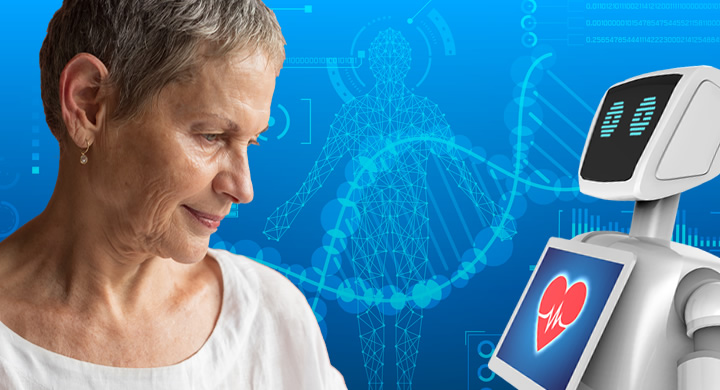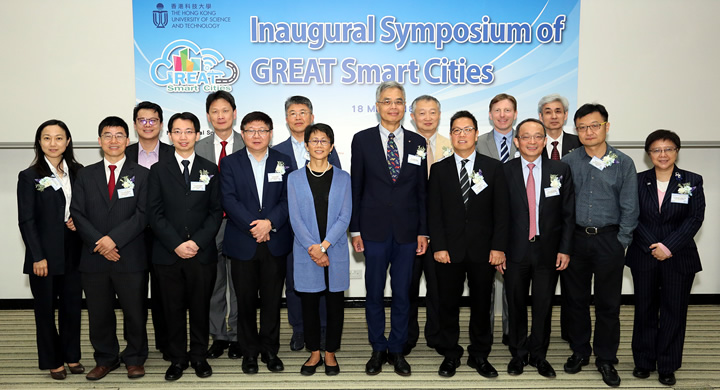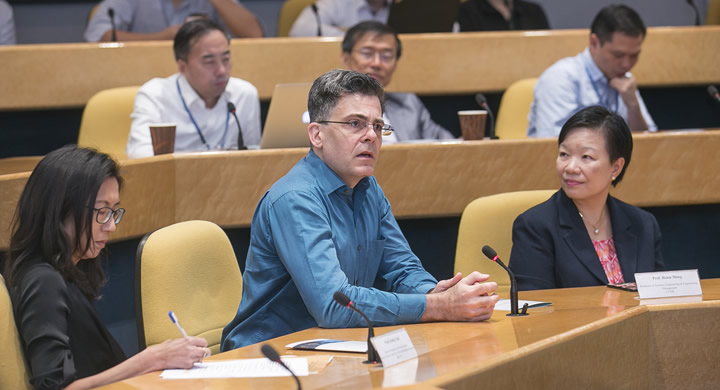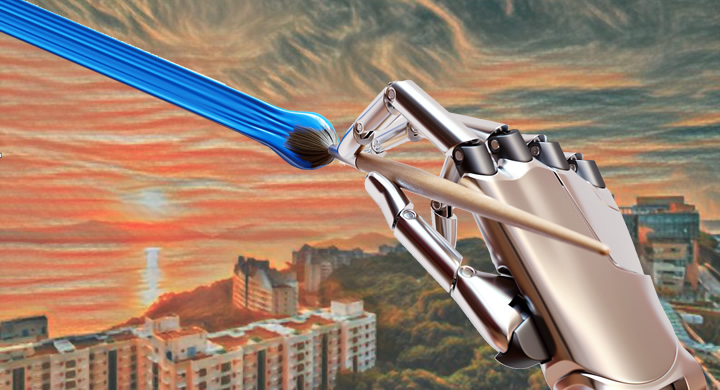
AI FOR HEALTH AND AGINGArtificial intelligence (AI) will bring drastic improvement in global health issues. By using AI and machine learning to process and analyze big data in real-time, health experts can identify at-risk populations for various diseases such as diabetes and heart disease, enabling medical and health organizations to pinpoint specific demographics or locations where population health issues exist, and to precisely target and implement treatment and education programs. In addition, with the rapidly growing elderly population worldwide, coupled with limited healthcare resources, calls for urgent machine-assisted elderly care solutions. Therefore, we aim to provide a fully integrated elderly care solution, addressing essential healthcare needs like nutrition, medication management, well-being monitoring, remote communication with family and medical professionals, empathetic conversations, and home navigation. By prioritizing human-centered design and rigorous studies, we propose AI, machine learning, and robotics solutions using computer vision and conversational AI. Ensuring safety and trustworthiness of the technology and leveraging anonymized data for insights, we strive to enhance the healthcare needs of the elderly and improve hospital care services all around the globe. |
RESEARCH PROJECTS
Multichannel Emotion and Intent Inference and Expression for Human-Robot Interactions Medical Data Mining for Alzheimer’s Disease, Dementia, and Cancer in the Hong Kong Populationr Nora the Quarantine Companion, a conversational AI helping people in quarantine with activity recommendation and social chat Humanoid Robotic Healthcare Assistant Bandwidth Aware Video Emotion Recognition in the Cloud Anticipatory control of exoskeletons using multi-modal human machine interfaces |

AI FOR SUSTAINABILITY
Leveraging AI technologies, business will be able to change their focus from short-term growth to long-term sustainable and resilient growth prospects. Public-Private dialogue and partnerships will be crucial in developing long-term solutions to overcome financial barriers and to achieve sustainable governance.
2018-2019
Smart Campus
University’s Level 50mm Smart Campus Initiative
- Robot receptionists around campus
- Smart course selection recommendation system
Research Forum
Sustainable Production & Consumption
Global Research Forum in June 2019

AI FOR HEALTH AND AGING
Artificial intelligence (AI) will bring drastic improvement in global health issues. By using AI and machine learning to process and analyze big data in real-time, health experts can identify at-risk populations for various diseases such as diabetes and heart disease, enabling medical and health organizations to pinpoint specific demographics or locations where population health issues exist, and to precisely target and implement treatment and education programs.
In addition, with the rapidly growing elderly population worldwide, coupled with limited healthcare resources, calls for urgent machine-assisted elderly care solutions. Therefore, we aim to provide a fully integrated elderly care solution, addressing essential healthcare needs like nutrition, medication management, well-being monitoring, remote communication with family and medical professionals, empathetic conversations, and home navigation. By prioritizing human-centered design and rigorous studies, we propose AI, machine learning, and robotics solutions using computer vision and conversational AI. Ensuring safety and trustworthiness of the technology and leveraging anonymized data for insights, we strive to enhance the healthcare needs of the elderly and improve hospital care services all around the globe.
Virtual Therapist Platform for Negative Emotion Detection, Monitoring, and Intervention in Elderly People
Multichannel Emotion and Intent Inference and Expression for Human-Robot Interactions
Medical Data Mining for Alzheimer’s Disease, Dementia, and Cancer in the Hong Kong Populationr
Nora the Quarantine Companion, a conversational AI helping people in quarantine with activity recommendation and social chat
Humanoid Robotic Healthcare Assistant
Bandwidth Aware Video Emotion Recognition in the Cloud
Anticipatory control of exoskeletons using multi-modal human machine interfaces

AI FOR SUSTAINABILITY
Leveraging AI technologies, business will be able to change their focus from short-term growth to long-term sustainable and resilient growth prospects. Public-Private dialogue and partnerships will be crucial in developing long-term solutions to overcome financial barriers and to achieve sustainable governance.
2018-2019
Smart Campus
University’s Level 50mm Smart Campus Initiative
- Robot receptionists around campus
- Smart course selection recommendation system
Research Forum
Sustainable Production & Consumption
Global Research Forum in June 2019

AI ETHICS AND GOVERNANCEAI technology has the potential to amplify and exacerbate many of the risks we face today. To be sure that AI is developed and governed wisely, government and industry leaders must ensure the safety, explainability, transparency, and validity of AI applications. It is incumbent on authorities, AI researchers, technology pioneers, and AI adopters in industry alike to encourage deployments that earn trust and avoid abuse of the social contract. Achieving this requires a collaborative effort to ensure that as AI progresses, its idea of a good future is aligned to human values and encapsulates a future that is safe for humanity in all respects – its people and their planet. |
RESEARCH PROJECTS
|

AI FOR ARTS AND DESIGN
There is already a great variety of software that utilizes AI and machine learning algorithms to produce creative works such as visual arts and music: from mimicking the style of an existing artist, emulating stylized movements in animations and video games, to composing entire music albums with the collaboration with human artists. In the near future, AI will evolve from being a creative partner to becoming a true creator of artworks by itself.

AI ETHICS AND GOVERNANCE
AI technology has the potential to amplify and exacerbate many of the risks we face today. To be sure that AI is developed and governed wisely, government and industry leaders must ensure the safety, explainability, transparency, and validity of AI applications. It is incumbent on authorities, AI researchers, technology pioneers, and AI adopters in industry alike to encourage deployments that earn trust and avoid abuse of the social contract. Achieving this requires a collaborative effort to ensure that as AI progresses, its idea of a good future is aligned to human values and encapsulates a future that is safe for humanity in all respects – its people and their planet.
Agenda
- Co-organize AI for Good Summit in 2019
(in collaboration with Xprize, the UN, UNICEF, HK Science Park and the HKSAR government) - Co-organize Workshops and Seminars on East-West Philosophy on Beneficial AI
(in collaboration with Beijing University and Cambridge University) - Work within Partnership on AI
- Create a named Lab on AI Ethics and Governance
- Create a course on AI governance with the Division of Public Policy (spring/ fall 2019)

AI FOR ARTS AND DESIGN
There is already a great variety of software that utilizes AI and machine learning algorithms to produce creative works such as visual arts and music: from mimicking the style of an existing artist, emulating stylized movements in animations and video games, to composing entire music albums with the collaboration with human artists. In the near future, AI will evolve from being a creative partner to becoming a true creator of artworks by itself.
